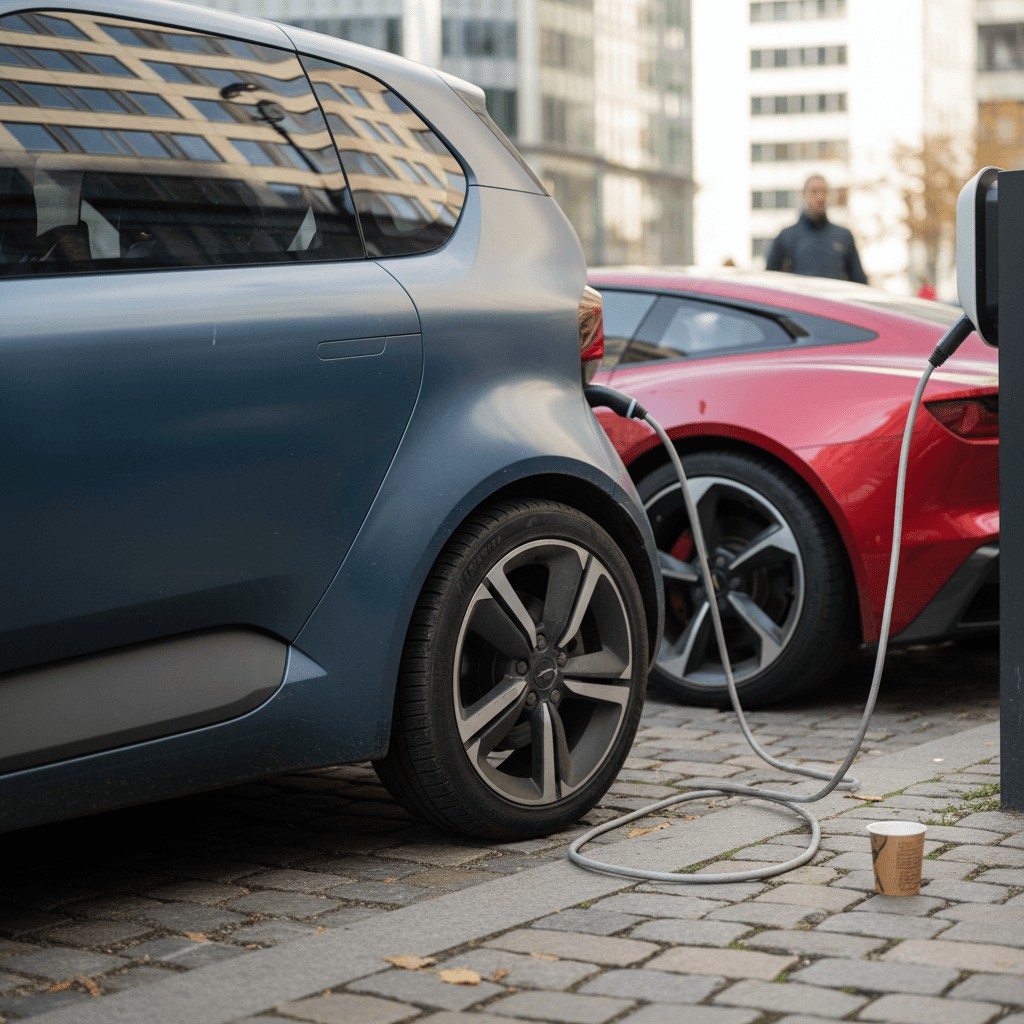If you’re typing “refurbished car batteries near me” into a search bar, you’re probably trying to save money, avoid getting stranded, or squeeze a bit more life out of a car you’re not ready to replace. That can be smart, if you understand the trade‑offs. This guide walks you through how refurbished 12V and EV batteries really work, what they cost, how to find reputable local options, and when you’re better off putting that money toward a used EV with a known‑good battery instead.
Two very different “car batteries”
Why people search “refurbished car batteries near me”
What are you actually trying to solve?
Same Google search, very different real‑world situations.
You need cheap transportation
Your main goal is keeping a car running on a budget. A new 12V battery feels expensive, and you’re looking for the lowest up‑front cost that still starts the car.
Your hybrid or EV needs a pack
Your vehicle still drives well, but the traction battery is failing and a dealer quote for a new pack looks terrifying. You’re wondering if a refurbished pack can save the car.
You care about waste and recycling
You’d prefer not to scrap a battery that still has life left. You’re curious how second‑life batteries fit into a cleaner, circular economy.
The right answer depends on which of those camps you’re in. Refurbished 12V batteries can be a sensible stopgap for budget transportation. Refurbished EV and hybrid packs are higher‑stakes decisions that demand more caution, and sometimes a completely different strategy.
How refurbished car batteries actually work
“Refurbished” can mean anything from a proper remanufacturing process with diagnostics and warranty to someone slapping a charger on a dead battery and throwing it back on the shelf. You need to understand the difference before you trust one in your car.
Refurbished 12V starter batteries
- Inspection: Case is checked for leaks, cracks, or severe corrosion.
- Testing: The shop measures voltage, cold‑cranking amps, and internal resistance.
- Reconditioning: They top up electrolyte (if serviceable), equalize charge, and sometimes use a desulfation charger to restore some lost capacity.
- Re‑rating: The battery may be sold under its original rating or derated if it no longer meets spec.
Done properly, you’re buying a tested used battery with a bit of life left, not something magically made new.
Refurbished hybrid & EV battery packs
- Module‑level testing: Technicians measure capacity and internal resistance of each module in the pack.
- Module replacement: Weak or failed modules are swapped with better used ones.
- Balancing: The pack is balanced so modules sit at similar state of charge.
- Reassembly & limited testing: The rebuilt pack is reinstalled and road‑tested.
This can work, but the pack is still built from old cells of mixed ages and histories. That’s why the warranty terms matter more than the marketing language.
There is no universal definition of “refurbished”
Pros and cons of refurbished 12V car batteries
- Lower upfront cost than a comparable new 12V battery.
- Keeps usable batteries out of the waste stream a little longer.
- Often good enough for an older car you don’t plan to keep long.
- Shorter warranty (or none) compared with new batteries.
- Uncertain remaining life, could last two years or two months.
- Quality varies wildly between local shops.

When refurbished 12V batteries make the most sense
Refurbished EV and hybrid batteries: a different ballgame
With hybrids and full EVs, the “battery” is no longer a $150 part, it’s the single most expensive component in the vehicle. That changes the math on “refurbished.” A cheap pack that fails early can turn a drivable car into an uneconomical repair overnight.
Second‑life EV battery market at a glance
Those big numbers mostly describe stationary storage, using retired EV packs for grid storage, backup power, or solar batteries. That’s very different from putting a refurbished pack back into a car that needs to handle fast charging, deep cycling, high currents, and safety standards.
In cars (high‑voltage traction packs)
- Must handle fast charging and high‑power acceleration.
- Safety standards are strict; thermal runaway risk must be controlled.
- Battery management software expects predictable behavior.
- Failure can mean a stranded car, or worse, a safety event.
In stationary second‑life systems
- Operate in controlled conditions at modest power levels.
- Great for solar storage, microgrids, and data centers.
- Easier to monitor, cool, and isolate if there’s a problem.
- Failure is inconvenient, but usually not life‑threatening.
Why EV packs are rarely “DIY refurbished” safely
How to find refurbished car batteries near you
Local availability will vary, but there are consistent ways to track down refurbished 12V, hybrid, and EV batteries in the U.S. The key is separating legitimate remanufacturers from side‑hustle resellers.
Where to look for refurbished batteries
Mix online search with old‑fashioned phone calls.
Local parts stores & recyclers
Independent parts stores, scrap yards, and battery recyclers often sell tested used 12V batteries. Ask specifically whether they offer refurbished units with a warranty, not just “used, as‑is” take‑offs.
Specialist hybrid/EV shops
In larger metros, look for hybrid battery rebuilders or EV specialty shops. They may offer refurbished high‑voltage packs with installation, diagnostics, and a written warranty.
Search and marketplace tools
Combine searches like “refurbished car batteries near me,” “remanufactured hybrid battery your city,” and “used EV battery installer.” Check reviews on Google Maps, Yelp, or local forums before you hand over a credit card.
Questions to ask any refurbisher or shop
1. What exactly do you do to “refurbish” the battery?
You want a concrete process, testing, capacity checks, module replacement or desulfation, not vague phrases like “we charge them up” or “we clean them.”
2. How long is the warranty and what does it cover?
For 12V batteries, look for at least a 30–90 day warranty. For hybrid/EV packs, 1–3 years is common from serious rebuilders. Clarify whether labor and diagnostics are covered if the battery fails.
3. Do you specialize in my specific make and model?
Hybrid and EV packs are platform‑specific. A shop that lives and breathes Prius batteries isn’t automatically qualified to handle a Chevy Bolt or Tesla pack.
4. What diagnostics do you run on my car before and after installation?
Proper shops check for trouble codes, cooling system issues, and software updates before blaming everything on the battery. Post‑install testing should confirm the pack is performing correctly.
5. What happens if the refurbished battery fails early?
Ask how quickly they can diagnose and replace a failed unit, and whether they have loaner vehicles or other support. This tells you how much they truly stand behind their product.
Pricing: how much should a refurbished battery cost?
Prices vary by region and vehicle, but there are clear ballparks that can help you spot deals that are too good, or too bad, to be true.
Typical battery pricing ranges in 2025 (U.S.)
Refurbished vs new batteries for common use cases. Always confirm local pricing, these are directional, not quotes.
| Battery type | Refurbished / remanufactured | Brand‑new / OEM | Notes |
|---|---|---|---|
| 12V starter battery (gas car) | $40–$90 | $120–$250 | Refurb is cheapest way to keep an older car going, but expect a shorter life and warranty. |
| Hybrid traction battery (e.g., Prius) | $800–$2,000 installed | $2,500–$4,500+ installed | Refurb packs may mix old modules; warranty and shop reputation are crucial. |
| EV traction battery (full pack) | Limited refurb options; often $5,000–$12,000+ | $15,000–$25,000+ (where full pack replacement is even offered) | On many EVs, a full pack replacement doesn’t pencil out versus selling the car. |
| Stationary second‑life battery (home/backup) | Project‑specific pricing | $8,000+ for new residential storage | Most second‑life EV packs are going into stationary storage projects, not back into cars. |
Use this as a sanity check when you see local ads or get phone quotes.
Beware of unrealistically low quotes
A better alternative: buying a used EV with a healthy battery
For many drivers, chasing a refurbished battery is a reaction to a car that’s aging out of its original mission. Instead of sinking four figures into a single component, it can be smarter to redirect that money into a used EV or hybrid with a verified healthy battery.

Why this often beats a refurbished pack
- You’re not throwing good money after bad in an older, less efficient vehicle.
- You get modern safety tech and lower running costs alongside a healthier battery.
- Financing spreads the cost over time instead of a single painful repair bill.
How Recharged fits in
At Recharged, every used EV we sell comes with a Recharged Score Report that includes verified battery health and fair‑market pricing. That means:
- Independent diagnostics on the high‑voltage pack.
- Transparent degradation data, so you know what you’re buying.
- Expert EV‑specialist support from shopping to delivery.
If your current car needs a pricey battery, it’s worth comparing that repair quote to the cost of moving into a used EV whose battery has already been vetted.
Run the numbers before you commit to a refurbished pack
FAQ: refurbished car batteries near me
Frequently asked questions about refurbished car batteries
Bottom line: is a refurbished car battery right for you?
Refurbished car batteries aren’t automatically good or bad, they’re tools, and like any tool they only make sense in the right context. A tested, warrantied refurbished 12V battery from a local shop can stretch the life of an older car without wrecking your budget. Refurbished hybrid and EV packs are higher‑risk: they can rescue a vehicle from an early grave, but only if the rebuilder is competent, transparent, and realistic about warranty coverage.
Before you hand over cash for the cheapest “refurbished battery near me,” ask detailed questions about the process, the warranty, and what happens if something goes wrong. Then run the math against another option: putting that money toward a used EV with a verified healthy battery. With services like the Recharged Score Report, you can skip the guesswork and own an EV whose most important component has already been independently checked, turning a potential repair nightmare into a controlled, predictable upgrade in how you drive and charge.

